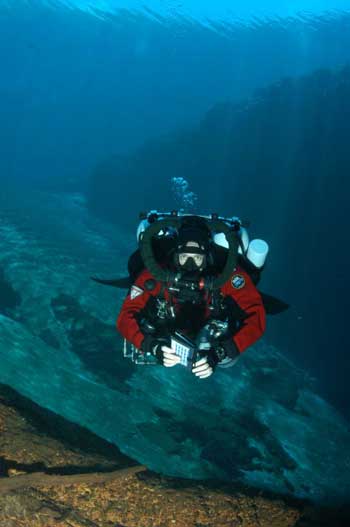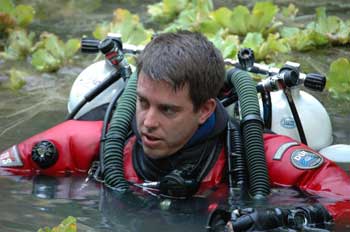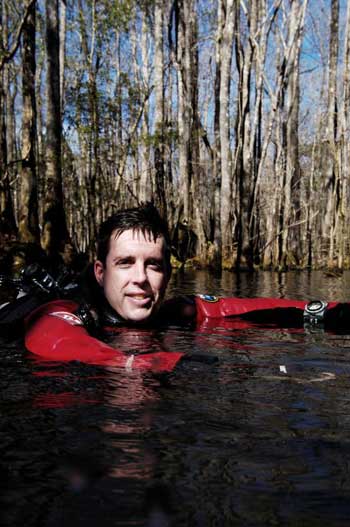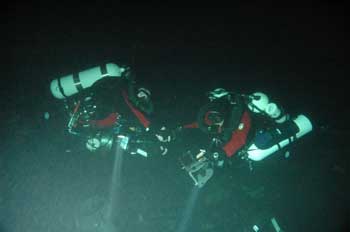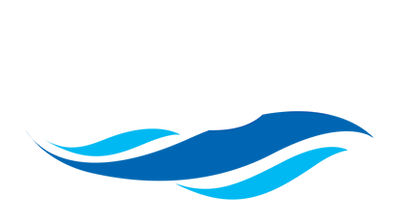|
Q. When / where did you start diving?
A. As a student at the University of Florida in 1988, a friend of mine told me the University offered SCUBA as a class. Knowing that my parents were still picking up my tuition and that there was an opportunity to meet some cute girls twice a week for pool sessions, I signed up. Little did I know that Jarrod Jablonski and Todd Kincaid were UF SCUBA instructors at the time and my life was about to change.
Q. What motivated you to become a diver?
A. Living in Florida and having access to some of the best freshwater and saltwater diving in the world year round was appealing. Since the ocean was quite a distance from the University of Florida in Gainesville, the locations for open water checkout dives were the local springs. This is where I got my first exposure to spring and cave diving. The springs were incredibly clear, at least until 100 new open water students jumped in, and at the bottom you could see the cave entrance. My instructor at the time had also started cave diving and thought he was some sort of big shot with his double 72’s while everyone else had singles but I was more interested in where he was going as he dropped out of sight and into the cave. After receiving my open water card I started making regular trips, sometimes daily out to the springs to dive. Keep in mind this was 20 years ago and gas was 89 cents a gallon so a 100 mile round trip for a day of diving was easy to justify even on a student budget. After getting yelled at on several occasions by cave divers, I realized that I needed different equipment and more training to be less obvious. I decided to pursue my cave certification and within a year of open water certification, I showed up to my first day of cave class to discover the other 2 students in the class were Jarrod Jablonski and Todd Kincaid. The rest is history.
Q. Where have you been?
A. Unfortunately not as many exotic locations as I would like having spent the majority of my time in the caves of North Florida. Although many of the places I have been while exploring these caves systems have been incredible. The recent exploration of Wakulla Springs’ R-Tunnel and downstream Turner Sink is difficult to describe but the cave is mind blowing and unlike anything I had seen before or expect to see in the future. I also had the opportunity to dive the Janos cave in Budapest, Hungary last year and that was quite spectacular as well. Cave diving beneath a modern, European city is quite interesting. I enjoy the caves of Mexico and wall diving in the Caribbean. Most of all I enjoy diving with motivated, skilled and passionate divers. Easy to find among my group of friends and the WKPP team divers.
Q. What diving accomplishment are you most proud of?
A. Without exception, the 2007 connection of the Leon Sinks and Wakulla Cave Systems. To have been part of such a remarkable group in pursuit of a potentially impossible goal was exciting and meant a great deal to me personally. While there are unlimited opportunities ahead for exploration in this area, I believe this particular accomplishment will always mean the most to me.
Q. What will the sport of diving be like 20 years from now?
A.Difficult to say exactly but I expect equipment will evolve as advances in materials and technology make everything lighter, more durable and easier to use and maintain. I believe it will become necessary for the sport diving community to continue to attract and more importantly retain divers if those working in the industry want to continue to make scuba diving a way of life. There are many alternative ways to spend leisure time and we must continue to bring new people into the sport, improve training so the experience is more enjoyable, develop continuing education so divers stay current and promote the enjoyment of diving and the experience of underwater exploration. I also believe an environmental element needs to be a bigger part of diver training and heavily promoted within the diving community to encourage divers to get involved at the local level t o protect and preserve their dive sites. This will become a bigger issue as development and environmental pressures continue to impact our diving sites whether those may be caves, reefs, walls, lakes or wrecks. We all have a vested interest and action sooner rather than later is best.
Q. Who do you admire in the diving community?
A. I admire the drive for exploration. Exploring caves, wrecks, reefs and far away places is not only extremely challenging but it is a tremendous amount of work. Team or expedition leaders know what I am referring to and many are doing it on a daily basis. I have a great deal of admiration for those within the WKPP that sacrifice their time and money to support and be part of something that is giving back in so many ways and at the same time challenging them to be better divers. GUE does a tremendous job emphasizing this as part of their training curriculum and the organization does an equally impressive job encouraging this type of approach world wide with their exploration and research initiatives. I suppose in the end, I admire people for getting involved and putting their skills to use in exploring and protecting the underwater environment. There are too many to name.
Q. Do you have any pre-dive, dive, or deco rituals?
A. Most certainly but they are too numerous to detail. Jarrod Jablonski has known me longer than anyone and we have spent a great deal of time together in the water over the past 20 years. He seems to find many of them amusing but they seem to work for me so why change now. I suppose the type of diving we do requires a certain level of obsessive behavior and excessive organization. In many ways I take it to the next level but I’ve also noticed similar behavior from many of my team members. Either they have similar personalities or they’re watching me closely. One of the hings I like most about diving is the ability to disconnect from the surface at the beginning of the dive and to stay isolated and enjoy the silence of long decompressions. Some would argue that a 16 hour decompression is too much silence but strangely enough, it’s never enough.
Q. Do you have any advice for a new drysuit diver?
A. Like any new diver or experienced diver adjusting to a new environment, I believe the best way to achieve confidence and comfort is to slowly build up experience. Many of the top guys on the WKPP have been diving for years and many have been diving together for years. Having built up experience over time and knowing your team members have done the same, allows one to focus on the diving and enjoy the experience. Spending time with your new drysuit in the pool, adjusting your weighting so you know what works with single tanks, double tanks, different types of insulation, etc. and then progressing to open water to refine your skills and build experience is important. Drysuit training with a qualified instructor is also worth considering but putting on a new drysuit and jumping off the back of the boat does not make much sense to me and in some cases may permanently ruin the experience of diving for many. I also encourage people to train with a buddy, spouse, etc. so there’s always someone available to dive. Diving is a team sport; learning new things and developing new skills is better done as a team.
Q. Do you know any good dive / fish jokes?
A. Not really much of a joke kind of guy. The team guys usually find me too serious.
Q. Where can people find out more about you, your courses, and products?
A.There is some great information about the history, accomplishments and recent efforts of the WKPP available through the GUE website – www.gue.com. There is also great material and information on the GUE website about diver training and research and exploration initiatives. I encourage those that are interested to follow through and get involved – think globally and act locally to educate others about local diving sites and protect the local diving environment. I also encourage current and future divers to consider the Halcyon line of diving equipment – www.halcyon.net. The company was founded in 1996 by explorers for explorers and we continue to lead in quality and innovation much the same way that DUI leads the drysuit business. The Halcyon system is simple, streamlined, durable and reliable enough for the most determined double tank explorer or the newly certified single tank open water diver looking for comfort in the water. A local Halcyon dealer can walk you through the product line and work with you on a custom fit system designed to last a lifetime. Read Casey's review on DUI's newest drysuit the FLX EXTREME Read Casey's review on DUI's Xm250 DiveWear
|
